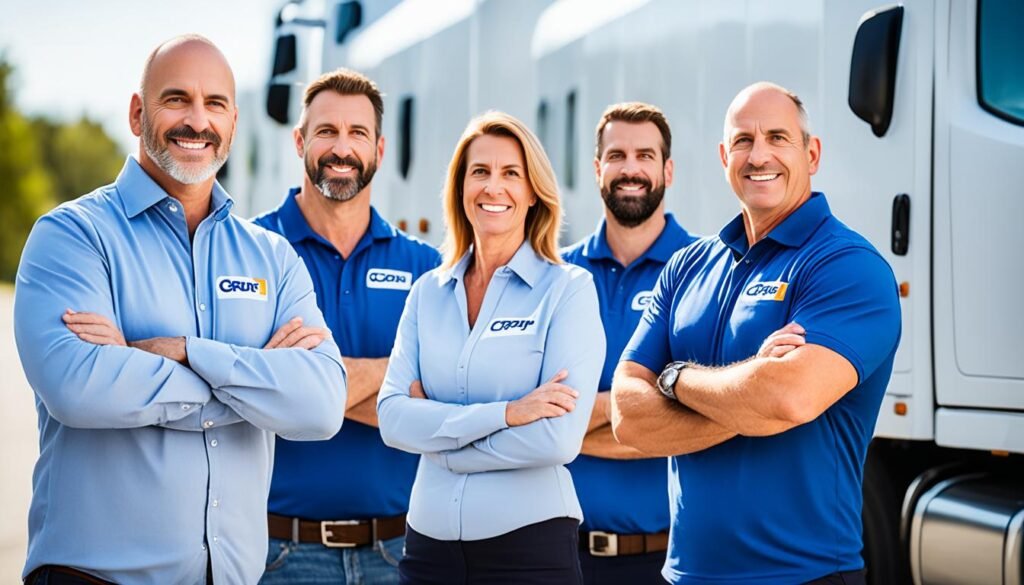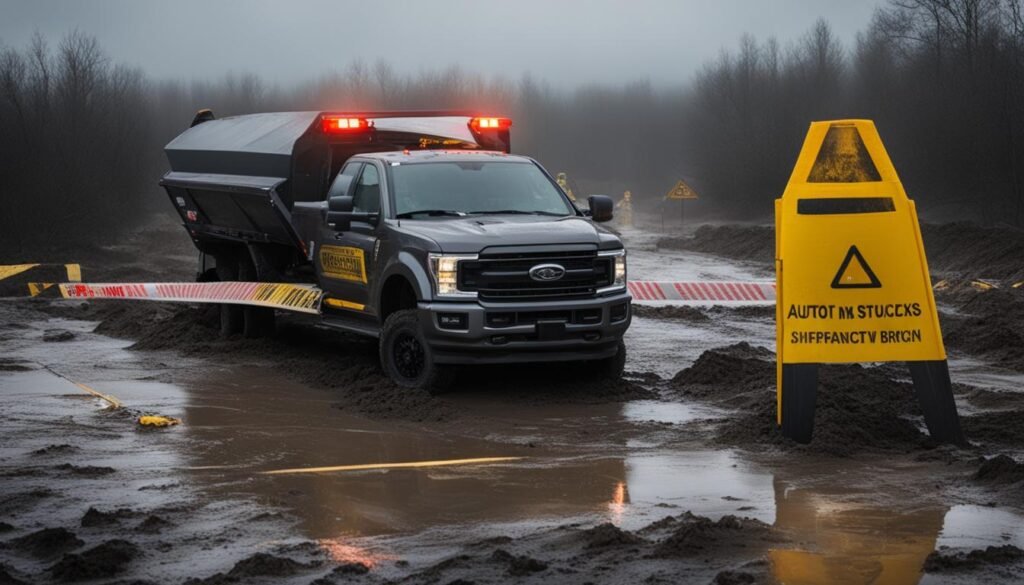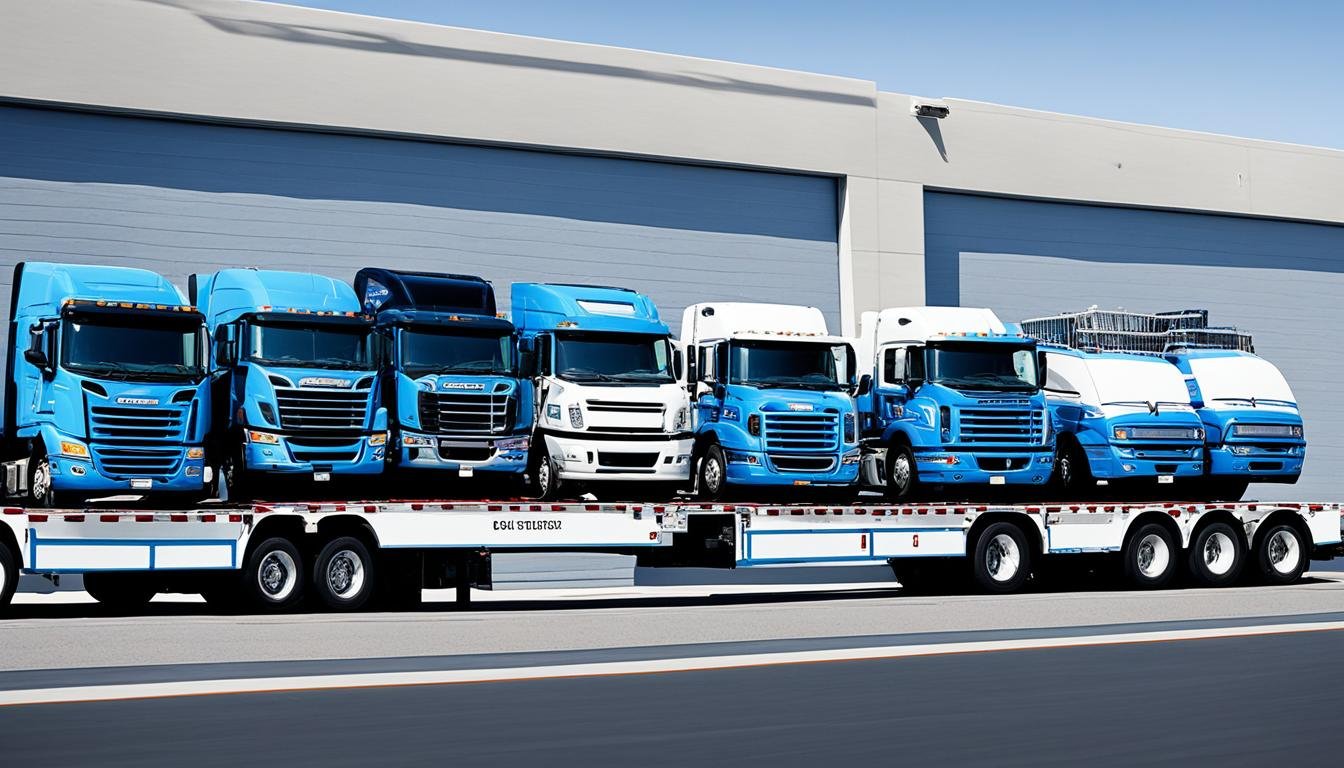Auto transport brokers are crucial in moving items. They connect people who need to ship goods with those who can. Brokers follow strict rules from the Federal Motor Carrier Safety Administration (FMCSA) and other bodies. This guide tells you what brokers need to do to follow the law in the American shipping world.
Key Takeaways:
- Auto transport brokers have to obey the FMCSA’s rules to run their business legally and right.
- They make sure the trucks that haul goods are allowed and signed up with the FMCSA.
- To get the okay to be a broker, they must give the FMCSA their business info to check.
- Brokers need enough money and the right insurance to pay if something goes wrong.
- They must keep honest and detailed records and do what the rules say without tricks.
Background of Auto Transport Brokers
Auto transport brokers are key in the transportation world. They set up the shipping of goods by working with truck companies. They’re in the middle, making sure goods move well from one place to another.
These brokers must follow tight rules in moving goods between states. The Federal Motor Carrier Safety Administration (FMCSA) makes sure brokers keep to the rules. These rules, like 49 CFR §371, are there to keep the industry honest and safe.
Following FMCSA rules shows brokers are serious and trustworthy. They help keep shipping up to high standards. Clients, both the ones shipping goods and the truck companies, know they can rely on these brokers.
FMCSA Regulations for Auto Transport Brokers
The FMCSA requires auto transport brokers to act in certain ways. Some of these regulations include:
- Registering with the FMCSA: Brokers sign up with the FMCSA and get a USDOT number. This number helps the authorities keep an eye on each broker.
- Maintaining Process Agents: Brokers pick special agents in each state they work in. These agents help with legal matters. They make sure brokers are reachable and responsible.
- Establishing Financial Liability Coverage: Brokers need insurance to protect against any harm caused during shipping. This insurance lets brokers do their job with confidence and protects everyone involved.
- Administrative and Financial Recordkeeping: Brokers keep thorough records of all their business. These records show they follow the rules and are fair in how they work.
It’s essential for brokers to keep to these rules. It helps them keep their place in the industry, prove they are reliable, and act responsibly. By knowing and meeting these standards, brokers can offer top-notch service to their customers.
As shown in the picture, auto transport brokers are in the middle, making sure goods travel safely from one point to another.
Interacting with Other Transportation Operations
Auto transport brokers work with many different transportation groups. This includes motor carriers, bona fide agents, and freight forwarders. It’s key for brokers to only team up with licensed and registered carriers. This is to follow FMCSA rules closely.
Motor carriers are very important for moving goods brokered by brokers. It’s critical for brokers to check that these carriers are registered with the FMCSA. This step makes sure everything is safe and reliable for those shipping items and those carrying them.
Besides carriers, brokers deal with bona fide agents and freight forwarders too. Bona fide agents help brokers by setting up transport services. Freight forwarders manage and plan shipments for different business needs.
A strong teamwork among brokers, carriers, agents, and forwarders is needed. Following FMCSA rules is a must. It helps brokers keep a professional standard and meet the transportation sector’s expectations.
Here is a visual representation of the different transportation operations that brokers may interact with:
| Transportation Operations | Description |
|---|---|
| Motor Carriers | Responsible for executing the transportation of commodities arranged by brokers. Must be authorized and registered with the FMCSA. |
| Bona Fide Agents | Authorized representatives of motor carriers who assist brokers in arranging transportation services. |
| Freight Forwarders | Specialize in the organization and coordination of shipments, catering to the complex logistical needs of various industries. |
Key Takeaways:
- Auto transport brokers interact with various transportation operations, including motor carriers, bona fide agents, and freight forwarders.
- Brokers should verify the registration and authorization of motor carriers with the FMCSA to ensure compliance with regulations.
- A collaborative relationship between brokers, carriers, agents, and forwarders is crucial for the smooth movement of goods.
The Application Process for Broker Authority
Individuals or companies wanting to be auto transport brokers must apply for broker authority. This application goes to the Federal Motor Carrier Safety Administration (FMCSA). The FMCSA checks to make sure applicants meet the requirements for legal operation.
Getting broker authority is key to running a brokerage business the right way. Brokers need to follow all FMCSA rules to pass the application process.
When applying, it’s crucial to give all information correctly and completely. This info includes your business name, address, and needed documents.
The FMCSA reviews the application’s details. They look at the applicant’s financial state, background, and if they follow the rules. Background checks and more may happen to check the info.
Brokers should be careful and make sure their application is perfect. Mistakes or missing info can slow the process or lead to rejection.
If the FMCSA approves the application, the broker gets the broker authority. This lets them work legally in the auto transport field. They can connect people who need to move goods with trusted carriers.
There may be extra steps in the application for certain types of cargo or larger operations. Brokers need to be ready for this.
Benefits of Obtaining Broker Authority
Becoming a broker with authority has many pluses. It shows brokers are serious and reliable, which can help business grow. They have more access to shippers and carriers.
Having broker authority means brokers have met certain high standards. It brings trust from their partners and more clients.
Plus, having broker authority opens the door to FMCSA’s helpful systems. This means better resources for a brokerage’s management and growth.
Getting broker authority is a big step for any auto transport broker. By doing it right, you show you’re serious about your business. Follow the FMCSA’s process well for success in the industry.
Financial Responsibility for Brokers
Auto transport brokers hold a key role in keeping their money matters in check. They must guarantee they can fulfill their deals with shipping companies and transporters. This way, they safeguard their own business and look out for their clients.
To be financially secure, brokers need the right insurance. They must buy policies that suit their business needs. These policies should cover any problems that might pop up, like damage or accidents during shipping.
Brokers also need enough money to handle their responsibilities. This means they should have cash on hand for paying the people who transport the goods, settling any issues that come up, and keeping their business solid. With strong financial backing, brokers can keep things running smoothly and earn their partners’ trust.
Caring about money matters is both smart and required by law. Brokers have to follow financial rules from the FMCSA and other authorities. These rules aim to make sure brokers act responsibly and can keep their promises. If a broker doesn’t live up to these standards, they could be fined or face other punishments.
Choosing to be financially responsible makes the shipping world safer for everyone involved. This approach helps brokers handle risks well, follow industry rules, and be seen as trustworthy. Being responsible with money is key to running a successful broker business. It encourages faith and accountability in the shipping world.
Requirements for All Brokers
All auto transport brokers must meet certain rules, no matter what they move. These rules help their business run smoothly. They make sure everything is clear, honest, and follows the law in the transportation world.
Records Keeping
It is key for brokers to keep accurate and updated records, as detailed in 49 CFR §371.3. They record deals and payments to show they are open and do things right. This includes stuff like shipping contracts, who they work with, and what they pay and get. Keeping good records helps brokers prove they follow the rules if they are checked.
Avoiding Misrepresentation
Following rule 49 CFR §371.7 stops brokers from saying things that aren’t true. They must be honest about what they can do. This builds trust with clients and workers and helps the industry look good.
Accounting Requirements
To keep things clear and check they’re doing well, brokers follow 49 CFR §371.13 about money matters. This means keeping track of what money comes in and goes out. It shows they are careful with money and can be trusted.
Brokers also have other jobs under the rules. This includes getting the right permissions, talking well with customers and workers, and doing what the law says.
By following all these rules, brokers can run a trustworthy business. It shows they care about doing the right thing. It makes their work look good and professional.
Summary of Broker Requirements
| Requirement | Description |
|---|---|
| Records Keeping | Brokers must keep good records of their deals. |
| Avoiding Misrepresentation | Brokers must be honest and not mislead people. |
| Accounting Requirements | Brokers have to manage their money well and show how they’re doing financially. |
| Additional Obligations | Brokers have more tasks to follow the rules and keep the industry at its best. |
New Requirements for Household Goods Brokers
Brokers for household goods now have to meet extra rules. These rules focus on keeping consumers safe, ensuring fair business, and having the right financial protection. The goal is to look out for people moving their stuff and follow what the industry expects.
These brokers must give clear info to folks about their rights. They share things like federal laws for consumer protection and estimates in writing. This way, the brokers show they are honest, follow laws, and do right by their customers.
To keep up and protect consumers, brokers need to really know these rules. They must always be aware of any changes. By doing this, they make sure they are fair, meet the law, and do their best at work.

Consumer Protection for Individual Shippers
The main point of these rules is to protect people moving their goods. Moving can be tough and confusing. Household goods brokers should give simple, clear info. This helps people make good choices.
“Household goods brokers make shipping easy and safe for people. The rules are there to make sure everyone’s treated right and prevent bad stuff.”
Financial Liability Coverage
Brokers also need to have the right money protection. This is key if something bad happens during the move. There should be enough funds to fix any damage or loss.
Operating Responsibly
By keeping to these special rules, brokers show they are responsible and trusted in their field. This matters as it keeps people safe and makes the service trustworthy.
Required Information and Policies for Advertisements
Auto transport brokers must follow certain rules in their ads and on their websites. These rules make sure ads show truthful, clear, and accurate information. By doing this, brokers can build trust with people looking for their services. It also helps them look professional and dependable.
Compliance with Regulations
Ads for auto transport brokers should tell customers all they need to know. A big rule is to put the broker’s USDOT number and operation details in ads and on the homepage, as per 49 CFR §371.107. The USDOT number is like the broker’s own ID. It lets customers check if they are doing things right. Showing this info in ads makes the company seem honest. It helps customers pick a broker they can trust.
Also, brokers need to have clear rules for when someone cancels, deposits, or wants their money back. These rules should be given to customers, according to 49 CFR §371.117. This way, everyone knows what to expect if plans change. Setting these rules keeps things fair and protects both the broker and the customer.
Table: Information to Include in Auto Transport Broker Advertisements
| Required Information |
|---|
| 1. USDOT number |
| 2. Operating authority |
Knowing and following these rules is vital for brokers. It means they are doing business the right way. They keep their customers safe and can be trusted as a legal, ethical business.
Consequences of Noncompliance with Regulations
Brokers in the auto transport field must know what happens if they don’t follow rules. The Federal Motor Carrier Safety Administration (FMCSA) and others have important guidelines. Not following these can lead to big fines or other serious actions that hurt a broker’s business.
The outcomes for not complying can be different based on how bad the mistake is. Brokers might have to pay huge fines, affecting how much money they make and how others see them. Fines can be from thousands to millions, depending on what’s broken and how many times it happens.
If you don’t follow these rules, the FMCSA may stop your business. Getting your permit to work again could be very hard and costly.
Brokers who don’t comply can also face more checks from the authorities. This means they have to use more time, money, and effort to fix things and prove they follow the rules.
Not following the rules can also harm a broker’s name in the industry. Others who depend on brokers for shipping and moving goods might not trust them as much.
It’s very important for brokers to prioritize rule following and keep up with standards. They should know the rules, get help if needed, and make sure they’re up to date with following the regulations.
By following the rules, brokers can keep their business safe and build good relationships with those they work with.

Are Auto Transport Broker Contracts Regulated by the Guidelines and Regulations?
Auto transport broker contracts are indeed regulated by guidelines and regulations. It is important for clients to have a full understanding auto transport broker of the terms and conditions outlined in the contract before signing. This ensures transparency and protects both parties involved in the transport process.
Further Assistance for Brokers
Are you an auto transport broker with questions or needing more help about regulations? The FMCSA’s Commercial Enforcement Division is here. We provide valuable guidance, important information, and updates on regulation changes.
Our team at the FMCSA’s Commercial Enforcement Division knows how vital it is to follow the rules. We are here to help brokers understand requirements, offer best practices advice, and give general guidance on regulations. Our experts are ready to help you.
It’s essential to stay up-to-date with regulatory changes and get help quickly to stay in compliance. By working with us, you get the support and advice needed to deal with the auto transport brokerage industry’s complex rules.
FAQ
What regulations govern auto transport brokers in the US shipping industry?
Auto transport brokers in the US must follow rules from the Federal Motor Carrier Safety Administration. They need to follow 49 CFR §371, which covers things like registration and insurance.
What role do auto transport brokers play in the transportation industry?
They help ship various goods by working with trusted carriers. This ensures safe and dependable delivery.
How do auto transport brokers interact with other transportation operations?
Auto transport brokers work with motor carriers and others to move goods. They make sure the carriers they use are allowed and follow the law.
What is the application process for broker authority?
To become a broker, you must apply to the FMCSA. They check your info to make sure you’re fit to do the job.
What financial responsibility do auto transport brokers have?
Brokers need the right insurance and money to keep their promises. They have to meet FMCSA’s financial rules to protect their deals.
What are the requirements for all auto transport brokers?
Brokers must keep good records, tell the truth, and handle money right. This keeps their business fair and legal.
Are there specific regulations for household goods brokers?
Yes, movers of household items have extra rules to protect customers. They need to share specific info with people moving their homes.
What information and policies should auto transport broker advertisements include?
Ads must show the broker’s DOT number and rules about paying or canceling. Clear policies help customers understand how the service works.
What are the consequences of non-compliance with regulations for auto transport brokers?
Not following the rules means facing fines or losing your license. It’s important to follow the rules and get help if you’re not sure.
Where can auto transport brokers get further assistance regarding regulations?
Brokers can call the FMCSA for help with the rules. Staying in the know and following the rules is key to running a smooth business.

